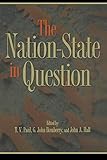The Nation-State in Question / John A. Hall, G. John Ikenberry, T. V. Paul.
Material type: TextPublisher: Princeton, NJ : Princeton University Press, [2020]Copyright date: ©2004Description: 1 online resource : 7 line illus. 20 tablesContent type:
TextPublisher: Princeton, NJ : Princeton University Press, [2020]Copyright date: ©2004Description: 1 online resource : 7 line illus. 20 tablesContent type: - 9780691221496
- 320.1
- online - DeGruyter
| Item type | Current library | Call number | URL | Status | Notes | Barcode | |
|---|---|---|---|---|---|---|---|
 eBook
eBook
|
Biblioteca "Angelicum" Pont. Univ. S.Tommaso d'Aquino Nuvola online | online - DeGruyter (Browse shelf(Opens below)) | Online access | Not for loan (Accesso limitato) | Accesso per gli utenti autorizzati / Access for authorized users | (dgr)9780691221496 |
Frontmatter -- Contents -- Illustrations -- Preface -- Introduction. Nation-States in History -- PART 1. NATIONAL IDENTITIES -- Chapter 1. Nationalism, Popular Sovereignty, and the Liberal Democratic State -- Chapter 2. What States Can Do with Nations: An Iron Law of Nationalism and Federation? -- Chapter 3. A State without a Nation? Russia after Empire -- Chapter 4. The Return of the Coercive State: Behavioral Control in Multicultural Society -- PART 2. STATE SECURITY -- Chapter 5. States, Security Function, and the New Global Forces -- Chapter 6. States and War in Africa -- PART 3. STATE AUTONOMY -- Chapter 7. National Legislatures in Common Markets: Autonomy in the European Union and Mercosur -- Chapter 8. The Tax State in the Information Age -- Chapter 9. States, Politics, and Globalization: Why Institutions Still Matter -- Chapter 10. Globalization, the State, and Industrial Relations: Common Challenges, Divergent Transitions -- PART 4. STATE CAPACITY -- Chapter 11. The State after State Socialism: Poland in Comparative Perspective -- Chapter 12. Rotten from Within: Decentralized Predation and Incapacitated State -- Conclusion. What States Can Do Now -- Contributors -- Index
restricted access online access with authorization star
http://purl.org/coar/access_right/c_16ec
Has globalization forever undermined the state as the mighty guarantor of public welfare and security? In the 1990s, the prevailing and even hopeful view was that it had. The euphoria did not last long. Today the "return of the state" is increasingly being discussed as a desirable reality. This book is the first to bring together a group of prominent scholars from comparative politics, international relations, and sociology to systematically reassess--through a historical lens that moves beyond the standard focus on the West--state-society relations and state power at the dawn of the twenty-first century. The contributors examine the sources and forms of state power in light of a range of welfare and security needs in order to tell us what states can do today. They assess the extent to which international social forces affect states, and the capacity of states to adapt in specific issue areas. Their striking conclusion is that states have continued to be pivotal in diverse areas such as nationalism, national security, multiculturalism, taxation, and industrial relations. Offering rich insights on the changing contours of state power, The Nation-State in Question will be of interest to social scientists, students, and policymakers alike. John Hall's introduction is followed by chapters by Peter Baldwin, John Campbell, Francesco Duina, Grzegorz Ekiert, Jeffrey Herbst, Christopher Hood, Anatoly Khazanov, Brendan O'Leary, T. V. Paul, Bernard Yack, Rudra Sil, and Minxin Pei. The conclusion is by John Ikenberry.
Mode of access: Internet via World Wide Web.
In English.
Description based on online resource; title from PDF title page (publisher's Web site, viewed 12. Dez 2020)


